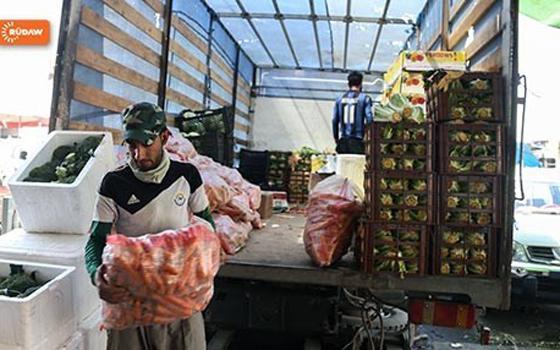Thousands of tons of Kurdish produce from Erbil, Duhok and Sulaimani are daily being peddled in the now liberated but war-wrecked city of Mosul.
"The Iraqi cities in general and in Mosul in particular have now become a good market to sell the Kurdistan Region’s farmers’ vegetable products," said Hussein Hama Karim, an official from the Ministry of Agriculture and Water Resources in the Region. "Thousands of tons of domestic products and that of Turkey and Iran being imported will once again be exported to other Iraqi cities on a daily basis."
Limited access to obtain needed vegetables and fruits since Mosul was liberated from ISIS has "paved the way for increased trade exchange in terms of agriculture between the city and the Kurdistan Region."
Karim added that Mosul is geographically important for trade exchange with Kurdish cities.
"Mosul city on the one hand is geographically [near] and has shared borders with the cities of Duhok and Erbil which could receive the products with less expenses, on the other hand, needed farming has not been done in the city due to the situation it faced," he asserted.
Lack of storage to keep products during their ripe seasons has forced farmers to sell and market together. The imbalance between supply and demand could result in a decrease of the products' prices and negatively impact farmers.
"To balance the price, we have done facilitation to farmers," Karim noted, adding that farmers could sell and export the surplus of their products to other Iraqi cities.
Karim explained they are in continued talks with Iraqi officials to avoid problems of this nature because it is ultimately the farmer who will be damaged.
He added as domestic products are exported to other Iraqi cities — but mainly Mosul — the prices of some products have increased.
The price of a 1 kilogram watermelon during its ripe season was in the past just 300 Iraqi dinars (IQD), but now it has doubled. Additionally, the price of a 1 kilogram cucumber was 150 IQD, but now is 350.
The proximity of Erbil and Duhok to Mosul has also paved the way for the trade between the three cities, as hundreds of loaded trucks can be seen dispatching goods to the city attempting to rebuild.
"Nearly 300 trucks on a daily basis dispatch tomatoes, potatoes, onions, peppers, eggplants, watermelons, melons, bananas, apples, apricots, peaches, plums, oranges and many other vegetables [from the Region] and those being imported from Iran and Turkey from Erbil customs to Mosul," said Salam Polis, a wholesaler of vegetables and fruit in Erbil.
Polis added that nearly 30,000 tons of vegetables and fruits are exported to other Iraqi cities every day, of this amount 30 percent goes to Mosul.
"Therefore we could say, everyday 1,000 tons of vegetables and fruits are dispatched to Mosul from Erbil customs," he estimated.
Due to the nine-month Mosul offensive against ISIS, the city's customs office has not resumed work yet, so an interim office near the Gogjali neighborhood, which was the first to be liberated from ISIS in October of last year, has been opened to receive agricultural products.
Rudaw
26 July






















































